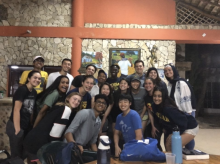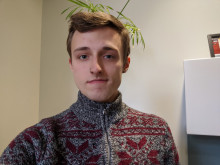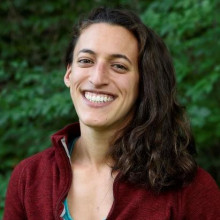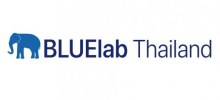Lywana Dorzilor
Posts tagged with Mini Grant in Blog Student Stories
Showing 1 - 5 of 5 items

We partnered with the U-M Library to help us find accessible foraging books and guides, as well as guides for facilitating inherently non-hierarchical spaces.

The Pre-Medical Club’s (PMC) Alternative Spring Break (ASB) is a health-oriented service and educational trip for students at the University of Michigan. Since its beginning in the early 2000s, PMC has worked with the Community Service Alliance (CSA) in the Dominican Republic to organize and plan the spring breaks each year. CSA is a multi-faceted organization which strives to empower communities through health initiatives, educational and youth programs, and a focus on supporting female community members. We have continued to partner with CSA throughout the years because of the positive effects we observe in the communities and because of the level of involvement they permit students to have.
Although CSA has many projects in multiple areas throughout the Dominican Republic, our group has chosen to orient our spring breaks around their health initiatives and educational programs. Additionally, the past four years we have been in the same province: Hato Mayor. Each year, the details of the project change, however the objectives remain the same. Following the goals of CSA, we hope to empower and build up communities in terms of health to a point where they can continue health practices safely and independently after we and CSA leave.
Our spring break this year focused on two main projects: water filter installation and bathroom construction. Before embarking on our journey, CSA provided us with the schedule and project goals. We aimed to install eight water filters and construct two bathrooms in two separate communities during our five days of work. Along with the manual work, we also allotted two afternoons of the trip to speak with school children about hand-washing and general hygiene tips. On the schedule were other events where we could learn more about the Dominican Republic and its health system and culture. These events included a tour of a cacao farm, dance lessons from a local dance group, and a visit to a local health clinic for a presentation and a Q&A session.
Although CSA has many projects in multiple areas throughout the Dominican Republic, our group has chosen to orient our spring breaks around their health initiatives and educational programs. Additionally, the past four years we have been in the same province: Hato Mayor. Each year, the details of the project change, however the objectives remain the same. Following the goals of CSA, we hope to empower and build up communities in terms of health to a point where they can continue health practices safely and independently after we and CSA leave.
Our spring break this year focused on two main projects: water filter installation and bathroom construction. Before embarking on our journey, CSA provided us with the schedule and project goals. We aimed to install eight water filters and construct two bathrooms in two separate communities during our five days of work. Along with the manual work, we also allotted two afternoons of the trip to speak with school children about hand-washing and general hygiene tips. On the schedule were other events where we could learn more about the Dominican Republic and its health system and culture. These events included a tour of a cacao farm, dance lessons from a local dance group, and a visit to a local health clinic for a presentation and a Q&A session.

Gender is a powerful social category that individuals constantly use to make sense of both themselves and those around them. The Western world splits people into two categories: woman and man. These two gender categories can be used to visually sort almost all things. Individuals constantly attribute masculinity of femininity not only to people, but to animals and objects, too. With this in mind, my thesis hoped to examine how individuals interpret the gender cues that others present, particularly those present in the face. Individuals who identify outside of the man-woman dichotomy are gaining increased visibility. The core question is how has the increasing visibility of the nonbinary community begun to change how people conceptualize gender, particularly in how they perceive the gender of others?

EARTH-RISE is a multidimensional project focusing on bridging the gap between high school and tertiary education in STEM, particularly earth sciences, and addressing the leaky pipeline for students in high schools that are under-funded and lack resources. The earth sciences are generally excluded from most high school curricula. Many earth science majors discovered the track upon entering college; most people are unaware it is a discipline throughout secondary school and beyond. In order to attract the attention of more students, it is important to strengthen earth science secondary (and primary) education. Additionally, two of the major components that promote retention through college and beyond is whether students identify as a member of the scientific community, and whether students have access to mentors they respect who are also enthusiastic. This project hopes to rectify both issues by introducing major topics in earth sciences in an accessible and exciting way (in the high-school classroom, in the laboratory, and in the field).
This program focuses on hands-on experiences (in-class, research and in field) for high school students to encourage retention in earth sciences. EARTH-RISE is designed to form a long-lasting relationship between Ypsilanti Community High School (and Ypsilanti public schools in general), Detroit public schools, and the University of Michigan Earth department. It focuses on encouraging high school students to engage in hands-on activities and research in Earth Sciences. The students at Ypsilanti Community High School received little science education in middle school and, lacking enthusiasm and encouragement from teachers during formative years, have ruled out pursuit of STEM in later years.
This program focuses on hands-on experiences (in-class, research and in field) for high school students to encourage retention in earth sciences. EARTH-RISE is designed to form a long-lasting relationship between Ypsilanti Community High School (and Ypsilanti public schools in general), Detroit public schools, and the University of Michigan Earth department. It focuses on encouraging high school students to engage in hands-on activities and research in Earth Sciences. The students at Ypsilanti Community High School received little science education in middle school and, lacking enthusiasm and encouragement from teachers during formative years, have ruled out pursuit of STEM in later years.

BLUElab Thailand unites students from multiple disciplines at the University of Michigan in pursuit of creating sustainable solutions for flood mitigation in our partner district of Mae Chan, Thailand with the collaboration of Chiang Mai University students and faculty in the PURPLElab organization as well as Michigan-based supporters such as BLUElab, the Center for Socially-Engaged Design and University of Michigan faculty.
Our ultimate goal is to create viable, sustainable solutions that satisfies two specific flood-related needs of the Mae Chan community. Currently, we are in the process of creating and selecting designs. We are translating these designs into physical concepts and prototypes, testing them with our newly built pipe-simulation test rig.
Our ultimate goal is to create viable, sustainable solutions that satisfies two specific flood-related needs of the Mae Chan community. Currently, we are in the process of creating and selecting designs. We are translating these designs into physical concepts and prototypes, testing them with our newly built pipe-simulation test rig.